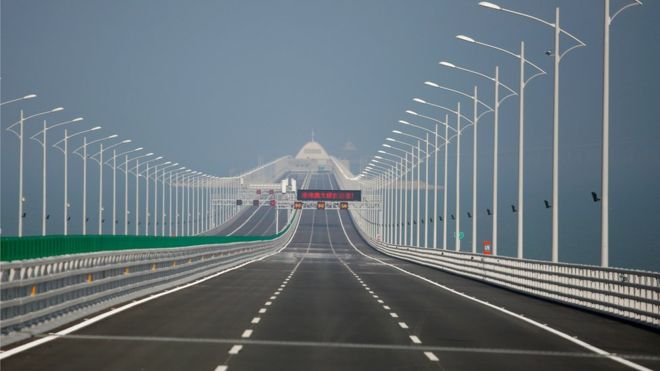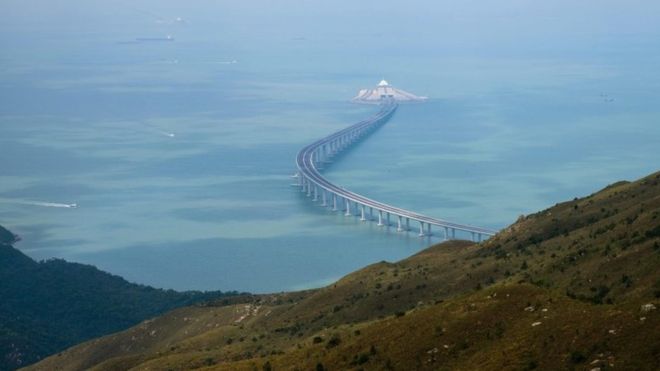Yesterday China opened the world’s longest bridge across the sea, connecting Hong Kong with Macau on the mainland. It is 55km (34 miles) long. It required the construction of two artificial islands so that the bridge can go underwater at places to allow for shipping traffic. It is not the longest bridge overall, just the sixth longest but the five longer ones are also in China. The bridge does not allow private vehicles to use it, just buses, trucks, government vehicles, and other vehicles with special permits, so traffic should be light.
Why did China build this massive bridge that reportedly cost $20 billion and ran way over schedule? This new route across the Pearl River estuary does cut the Hong Kong-Macau driving time of four hours to about half an hour. But other factors are suspected of being at play, the main one being that China wants to increase the links with Hong Kong, currently enjoying some level autonomy, before it fully becomes part of China in 2047.
The bridge is undoubtedly an impressive feat of engineering. It is clear that the Chinese are now the world’s leader in terms of being able to conceive of, design, fund, and implement massive infrastructure projects and they are doing so all over the world. I cannot recall what the last major such project in the US was, after the interstate highways system and the dams that were built in the mid-twentieth century.
You can see a video of the bridge.



Pretty easy to do whatever you want when you dont have to answer to ignorant dumbfucks who cry “boondoggle” at every government expenditure, no matter how sensible or beneficial it would be. Autocratic societies are at implementing their agenda like that.
And just to head off any potential misunderstanding about my sympathies, “effective” does not be “good”.
And somehow, a word got swallowed up in one of my sentences.
“Autocratic societies are effective at implementing their agenda like that.”
It’s a good way of cementing hegemony. They’d have dug a canal (like we didd in Panama) if the topography was right.
I worry about the stupid “freedom of navigation” exercises. Imagine the shitfits if some other navy started parading up and down by San Diego or in the Gulf of Mexico! The US Navy have always been fuckups. They got us into Vietnam (or were the excuse) the same way.
I am reminded of the Saudi Arabia--Bahrain causeway. Great for tourism and handy for sendingSaudi tanks to Bahrain in periods of unrest (see Arabic Spring).
@ 3 Marcus
I don’t think “freedom of navigation” issues apply here as the bridge is in the Pearl Estuary and clearly in Chinese waters.
Of course that is assuming Trump and the US navy can read a chart.
$20 billion? That’s ridiculous. Why, it’s almost 1/16th the (current estimated) cost of of the F-35 military aircraft that the U.S. plans to buy. And for something with mainly civilian benefit, too. Talk about silly! All U.S. citizens should be thanking God that, since the useless boondoggle of the interstate highway system, the U.S. government doesn’t do things like this any more.
IMHO, it is a political structure meant to solidify Hong-Kong integration into Mainland China. But it is also a great project meant to establish China as a great cultural power and leader among nations. The US used to do this sort of thing. The Panama canal, Moon shots, Hoover dam, interstate highways were all more about national prestige and proof of vigor than practical projects. All of them produced practical and measurable immediate and direct benefits but the big payoff was prestige and synergy.
As we have lost our vigor and become more Roman in outlook we have turned away from great feats that may payoff in the long term in hard to quantify ways and more toward small, short term profitable, and often parochial undertakings.
Sad.
Art: Small, short term profitable and parochial undertakings would be great. I might prefer to live in a New Zealand or a Denmark or a Uruguay not so devoted to grandiosity and overweening pride. But we are not doing that.
Instead we are spending all of our resources on Spreadsheet Diddling (the financial services industry, or “vampire squids”) and 700 military bases and, as noted above, planes that cannot fly in the rain.